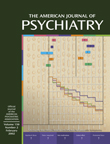Clozapine-Induced Stuttering and Seizures
To the Editor: Stuttering induced by psychotropic agents has been anecdotally described as being associated with clozapine treatment (1–3). We describe an instance of clozapine-induced stuttering in a patient who later developed generalized seizures.
Mr. A, a 28-year-old man who had been diagnosed with paranoid schizophrenia of 8 years’ duration, was treated with clozapine because treatment resistance. An EEG performed when he was receiving 150 mg/day of clozapine showed bilateral frontotemporal slowing (left more than right), generalized nonparoxysmal sharp and slow waves, and a photic convulsive response. Because Mr. A was having a good response to clozapine, it was decided to continue giving him clozapine under close supervision. However, at a clozapine dose of 300 mg/day, he developed stuttering, which worsened with further increases.
At that point, we were unaware of any association between clozapine and stuttering. It was only when Mr. A developed severe stuttering and subsequently had a generalized tonic-clonic seizure when he was taking 425 mg/day of clozapine that we considered that the stuttering might be related to clozapine-induced seizures. We then performed a literature search on PubMed using the key words “clozapine” and “stuttering,” which yielded three related reports (1–3). Our observation of clozapine-induced stuttering was supported by the dramatic improvement in Mr. A’s stuttering after his clozapine dose was reduced to 200 mg/day. Concurrently, we started treatment with valproate and titrated the dose up to 800 mg/day.
An EEG taken a day after Mr. A’s generalized seizure showed generalized nonparoxysmal slowing and a photic convulsive response in posterior regions of the brain. The association between stuttering and seizures was further bolstered by the fact that Mr. A did not have a reemergence of stuttering when his dose of clozapine was again increased to 300 mg/day (the dose at which stuttering had initially appeared) while he was also taking valproate. A normal EEG corroborated this evidence.
This report supplements the only report that we know of that relates clozapine-induced stuttering to epileptic brain activity (3). An association between stuttering and dystonia has been previously described (1), but our patient showed no evidence of dystonia, which was thus excluded as a cause of stuttering. The authors of that report (1) may have misattributed stuttering to coincidental dystonia, although their patient had significant EEG abnormalities.
Stuttering has been demonstrated to occur in association with seizures and to respond to treatment with antiepileptic drugs (4). Patients with stuttering without seizures have also been shown to have EEG abnormalities, such as background activity that is too slow for age (5). When coupling this observation with the hypothesis that patients with stuttering may have predominantly left-sided abnormality (6), it is tempting to speculate, albeit with caution, that stuttering accompanied by EEG abnormalities—especially left-sided slowing (as in this case)—in patients taking clozapine may be a harbinger of seizures. Further studies are required to address this issue.
1. Thomas P, Lalaux N, Vaiva G, Goudemand M: Dose-dependent stuttering and dystonia in a patient taking clozapine (letter). Am J Psychiatry 1994; 151:1096Google Scholar
2. Ebeling TA, Compton AD, Albright DW: Clozapine-induced stuttering (letter). Am J Psychiatry 1997; 154:1473Medline, Google Scholar
3. Supprian T, Retz W, Deckert J: Clozapine-induced stuttering: epileptic brain activity? (letter). Am J Psychiatry 1999; 156:1663-1664Link, Google Scholar
4. Nowack WJ: Adult onset stuttering and seizures. Clin Electroencephalogr 1986; 17:142-145Medline, Google Scholar
5. Klepel H, Kuhne GE, Mackerodt G: [Incidence of electroencephalographic findings in children with stuttering compared to healthy children of the same age]. Psychiatr Neurol Med Psychol (Leipz) 1982; 34:488-492 (German)Medline, Google Scholar
6. Geschwind N, Galaburda AM: Cerebral lateralization: biological mechanisms, associations, and pathology, I: a hypothesis and a program for research. Arch Neurol 1985; 42:428-459Crossref, Medline, Google Scholar



